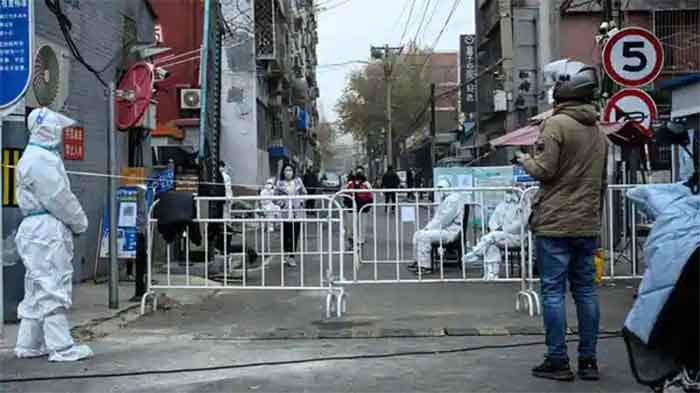
On March 11, 2020 the World Health Organisation (WHO) declared Covid-19 as a pandemic. Two years into the pandemic, Asia continues to see disparities in access to vaccines which has prolonged the pandemic for Asians and deepened existing inequalities across the region. Members of the Peoples Vaccine Alliance (PVA)-Asia called upon governments to invest in public healthcare services and ensure women and other vulnerable groups have equitable access to COVID-19 vaccines.
Speaking at a webinar organized by PVA Asia, Regional Policy and Campaigns Coordinator for Oxfam in Asia, Sunil Acharya said cases in Asia and Pacific remain high, with almost 600,000 cases daily and more than 200,000 deaths a day as per the late February 2022 data. He pointed to the disparity in vaccination rates across the region. “Countries such as Afghanistan lag far behind others in vaccination rates. Within countries, remote regions have much lower vaccination rates and the most vulnerable among populations, most of whom lack identification documents are being left behind” he said.
He also pointed out that COVID-19 has already pushed 148 million Asians into poverty, while over 100 million Asians have lost their jobs in the last two years. “Vaccination disparity is deepening other forms of disparity in the region. Unless vaccines are made available to everyone in Asia, the pandemic will continue and more people will be pushed into poverty,” he said.
Calling upon governments to increase public health spending, Sunil shared Oxfam’s research that shows a wealth tax of 2% to 5% on Asia-Pacific’s multi-millionaires and billionaires could raise an additional USD 776.5 billion, enough to increase health spending in the region by 60%. “Such measures can lessen the suffering of Asia’s poorest and prevent health systems from collapsing during future crises,”.
Sharing Indonesia’s experience, Dini Andriani from Penabulu Foundation said COVID-19 tests remain out of reach for most people and called upon the government to ensure affordable testing services. “During the outbreak of the Delta variant, hospitals were full and healthcare infrastructure could not keep up with the number of people who needed treatment. Weeks later when the Omicron variant hit the country, the government’s response was the same. Even as the symptoms are milder, the government must not show complacency in its response.”
Saima Zia from Crofter Foundation and Pakistan Kissan Rabita Committee noted that in Pakistan some facilities had offered lower-priced testing kits at (10 USD per test), the handling of specimens was not ensured and test results were unreliable. “Expensive tests prevented many people from getting tested in time. Public healthcare services needed for COVID treatment were overwhelmed and private healthcare is not affordable for most people,” she said.
Ms. Zia also discussed the gender disparity in access to vaccines and said that according to government statistics, 49% of the population has been vaccinated, however many women do not have identification documents which are needed for vaccination. “This has impacted women’s access to COVID-19 vaccines,” she said.
Fight Inequality Alliance Lead in India Anjela Taneja said that in India, though 80% of the population has been vaccinated, however there are disparities in terms of gender and wealth. “The National Capital Region (NCR) of Delhi has lower vaccination among females, and Dalits have even lower vaccination rates,” she said.
Public policy expert professor Rajendra Pratap Gupta highlighted that in India, there are three divides that are affecting access to COVID-19 vaccination i.e. the economic divide, defined by income, information divide defined by vaccine hesitancy and digital divide, both in terms of access to physical infrastructure and access to digital technology. India, for example, experiences these three divides, with poverty and the income classification and the lack of access to digital technology.
He highlighted the importance of digital healthcare services in the COVID-19 response but emphasized that while digital health does not replace primary health care services, it can provide solutions. “Digital health, through the use of artificial intelligence, can offer primary healthcare services,” he said.
Dr. Josh San Pedro from the Coalition for People’s Right to Health (CPRH) in the Philippines said access to COVID-19 related services in the Philippines remains an issue with the testing cost roughly around 53USD in the public health facility and almost 70USD at private facilities. “While almost 60% of the population is vaccinated in the Philippines, there is great variation among provinces, with people in far flung areas lacking access,” he said.
Josh called on the Philippine government to support the call on temporary TRIPS waiver, and ensure equitable access of all communities to diagnostics, medicines, vaccines, and technologies.
Amani Mustafa from Action Aid Palestine said Palestine has been struggling with access to COVID-19 vaccines and is currently reliant on COVAX. “While 99.4 of the population in Israel is fully vaccinated, in Palestine, only 49% of the population is fully vaccinated. Israel presents itself as among the most successful in the world in terms of vaccination rates, however many Palestinians in West Bank are still waiting to receive vaccination, despite Israel’s obligation to provide vaccines under the Geneva Convention,”.
Arjun Bhattarai from NGO Federation Nepal said Nepal has received nearly 20 million vaccines from COVAX, however the country faces primary obstacles around procurement and shipment, including lack of cold storage facilities. “The weak public health system at the local level in Nepal has slowed vaccine rollout, especially in the provinces. The government must prioritise vulnerable communities in vaccination campaigns,” he said.
…
About PVA – Asia: People’s Vaccine Alliance – Asia is an alliance of advocates for an equitable and fee COVID-19 vaccine for all people and affordable for all nations.
11th March 2022 marks the beginning of three years after WHO declared Covid-19 pandemic. For more information about PVA – Asia follow @PVA_Asia in Twitter.















































